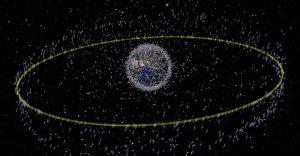Space Domain Awareness – How the UK and US Cooperate
24th Mar 2024
The fact that we have a U.K. one-star general on the U.S. Space Command headquarters staff speaks volumes
Brig. Gen. Devin Pepper, U.S. Space Command
UK – US collaboration is a long-standing part of a mutual military strategy, and this extends to space observation, too. In recent years, they have started to work even more closely together in the field of Space Domain Awareness, or SDA, with new programmes introduced to share intelligence and information.
Both the UK and US possess a number of cyber, ground and space-based systems that can detect, warn about and even predict threats and incidents in space. With the growth of private space industry, particularly in the UK, you can see why the countries are keen to work even more closely together to pool their knowledge.
As former UK Defence Secretary Ben Wallace explained in the Defence Space Strategy published by the government: “It is vital that we continue to work within key alliances, including international partners, industry and academia, to achieve success and make the most of opportunities. We will deepen our close work with the U.S. and will seek to collaborate further with Five Eyes partners, the Combined Space Operations (CSpO) partner nations, NATO and other likeminded powers, as we develop our Defence space capabilities.”
So what shape is this collaboration taking?
The ESC MOU
ESC MOU is the Memorandum of Understanding concerning Enhanced Space Cooperation, signed by the commanders of U.S. Space Command and U.K. Space Command in 2022. This is a new phase of collaboration, based around closer military cooperation.
Areas covered in the agreement include harmonising military space requirements, more joint activities, and crucially, more sharing of information. This includes SDA efforts.
The countries already work closely together. “The fact that we have a U.K. one-star general on the U.S. Space Command headquarters staff speaks volumes,” said Brig. Gen. Devin Pepper, the deputy director of strategy, plans, and policy for US Space Command.
The ESC MOU is not legally binding, but provides a more simple and straightforward way for these countries to share their knowledge and information and collaborate in the future.
Air Vice-Marshal Paul Godfrey, commander of U.K. Space Command, who was part of the agreement, spoke about the benefits of the agreement and the need for more collaboration when it comes to SDA.
“Many of the discussions we’re now having are about understanding where the U.S. is going, where we can add value, and with the wider partners as well, the allies and partners from Five Eyes, the Combined Space Operations Vision and NATO as well,” Godfrey explained.
The Five Eyes is another example of collaboration between English-speaking nations, as the alliance between Australia, Canada, New Zealand, the United Kingdom and the United States enables sharing of intelligence and information.
The focus on SDA was also on Godfrey’s agenda when he spoke on a recent podcast regarding “understanding what is going on out in that environment,” said Godfrey. “And that’s very much where the U.K.- U.S. collaboration and the other allies’ collaboration come in.”
Godfrey went on to explain the challenges of SDA and having data and observations in different parts of the world. “We’re all looking at the same thing in space and all using our different sensors to build that picture of what’s going on.”
JCO-Global
The UK established a space domain awareness cell in 2023, with the support and cooperation of the US. This will enhance orbital surveillance and is part of the RAF and UK Ministry of Defence efforts for SDA. The cell, called the ‘Joint Task Force-Space Defence Commercial Operations Cell’, is an extension of the US-led JCO programme which has focused on unclassified indications of orbital activity. These are found using a wide range of research, commercial sensors, and analytical tools. The cell is based at RAF High Wycombe and collects and shares data relevant to the space domain.
The JCO collaboration has been operating since 2020 when the US and UK identified a need to better monitor objects and launches in space. This is an area where the need is growing due to commercial entities as well as government and military craft.
The JCO-Global construct is intended to deliver universal coverage by creating these “cells” internationally. It is hoped that the task force will expand globally and give a wider overview of what is happening around the world, but is currently being led by efforts from the UK and US governments.
Speaking of the benefits of the JCO, Defence Space Commander, Air Vice-Marshal Cath Roberts explained: “Space is of global significance. Defence is collaborating with international partners to maximise resilience in a contested space domain. SDA allows us to monitor activities in space, detect and respond to potential threats.”
Deep Space Advanced Radar Capability (DARC)
Another way in which the UK and US are collaborating is the Deep Space Advanced Radar Capability (DARC), a programme that also includes Australia.
The programme will provide 24/7 capabilities to track objects in deep space, and the memorandum between the three countries will last for 22 years, with a goal of being fully operational by the end of the decade.
“The Deep Space Advanced Radar Capability will leverage the geography of the United States, Australia, and the United Kingdom to further enhance our collective space domain awareness: the ability to track, identify and characterise space objects. Space domain awareness is foundational to responsible space operations, and it is essential for responding to activity in space, whether that activity is routine or hostile,” explained U.S. Assistant Secretary of Defense for Space Policy, Dr. John Plumb.
Though the countries already work together on space domain awareness, as explained, DARC has a focus on higher sensitivity, greater accuracy, higher capacity and more agile tracking of objects in Geosynchronous Earth Orbit.
US Chief of Space Operations Gen. Chance Saltzman explained that: “As the space domain rapidly evolves, we must continue taking deliberate steps to ensure our collective ability to operate safely, and our nations are uniquely positioned to provide that capability on a global scale.”
A number of site surveys were carried out to choose optimal locations for the placement of satellites and that data is collected from numerous sources. The positioning of the UK and Australia on the globe allow wider coverage and a more complete strategic picture of space.
Space Domain Awareness is of continued importance
All of these initiatives have launched in a relatively short space of time, showing the importance of knowledge in the growing space domain. With more and more independent and commercial space companies, it is becoming harder to keep track of what is happening in space, and what represents a threat. This is one of the reasons why people have moved so quickly to create solutions to protect the British and American people and interests in space, including the Deep Space Advanced Radar Capability (DARC), JCO-Global, and ESC MOU.





Thank you for your comment! It will be visible on the site after moderation.